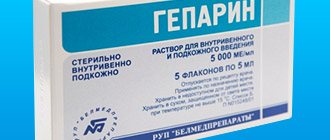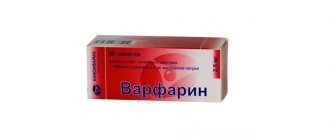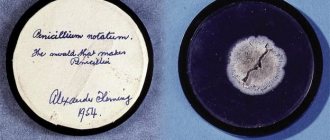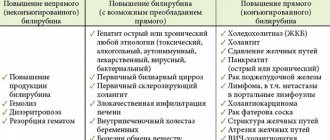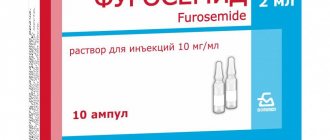In the treatment of various disorders of the nervous system and psyche, the drug Acefen (meclofenoxate) is often prescribed.
Also, the use of this drug helps to quickly restore the body after various traumatic brain injuries and severe stress.
The drug is produced in the form of round tablets. The tablets are coated on top with an edible coating; each dosage is 100 mg of active ingredient.
The tablets are placed in cell-type blisters, each of which contains 10 capsules. Blisters are contained in a cardboard package of 5 pieces.
One tablet contains 100 mg of the active ingredient - meclofenoxate.
What side symptoms may appear?
While using the medicine, the following unpleasant symptoms may occur:
- the occurrence of various allergic reactions;
- pain in the stomach;
- the appearance of heartburn;
- feeling of anxiety, fear;
- sleep disorders, namely insomnia;
- There may be an increase in appetite.
If the drug is taken by patients with schizophrenia, there may be increased anxiety, delusions, an increase in hallucinations, and an increased feeling of fear.
In general, side effects are rarely observed during the use of the drug. They are usually mild and go away on their own in the first days of treatment.
Practical application experience
We suggest studying the doctor's review and reviews of patients who took Acefen in one form or another.
Acefen is a nootropic medicine with psychostimulating effects. Its use helps eliminate various disorders of the central nervous system.
This drug is often prescribed for asthenia, which is accompanied by severe stress, exhaustion of the body, and loss of strength.
It can also be used after various traumatic brain injuries that have had a negative impact on the nervous system. Acefen improves blood circulation in the brain, due to this it quickly restores the central nervous system, improves the psyche and contributes to the rapid normalization of the general condition of the whole body. You can take it yourself; the medicine is sold at the pharmacy without a prescription.
Psychotherapist, Nevrodok website expert
After a traumatic brain injury, my husband began to experience problems with the nervous system. He became inattentive and began to forget everything. In addition, he began to constantly get tired, which had not been noticed before.
As a result, the doctor recommended the drug Acefen to improve cerebral circulation. What surprised me was that the product is sold at the pharmacy without a prescription, so you can take it yourself. There are practically no side effects. In addition, after my husband started taking the medicine, he felt much better, he became collected and attentive.
Oksana, 39 years old
After a stroke, my mother developed disturbances in her brain function. She was prescribed various nootropic drugs.
Additionally, the doctor recommended taking the medicine Acefen to improve the condition of the nervous system and blood circulation in the brain.
I don’t know what exactly was prescribed that had such a positive effect, but my mother managed to quickly recover from the stroke. What is noteworthy is that improvement began to be observed after using Meclofenoxate.
Lyubov, 45 years old
special instructions
When using Acefen, you should pay attention to the following nuances:
- It is necessary to carefully monitor patients who have various stomach and intestinal disorders, as well as hemorrhagic diathesis, Crohn's disease, and hematological disorders. If these disorders occur, the use of the medicine should be stopped.
- If patients have liver disorders, then the use of the drug should be started with a dosage of 150 mg.
- When using the drug for therapeutic treatment, you should avoid driving and performing activities that require increased attention.
- If acetylsalicylic acid and other non-steroidal drugs are used together with the medicine, side effects may increase.
- It is not recommended to use in combination with Methotrexate, because there is a possibility of increasing the concentration and toxicity of the latter component in the blood plasma.
Directions for use and dosage
The tablets should be taken without chewing three times a day after meals, with the last dose taken before 16.00 to avoid causing sleep disturbances.
The daily adult dosage varies from 3 to 5 tablets of Acefen, the children's dosage is 2-4 tablets.
The dosage and duration of the treatment course are prescribed individually by the doctor. As a rule, the duration of treatment is 1-3 months. A significant effect usually appears after several weeks of daily use of Acefen.
Indications for use of Acefen
According to the instructions, Acefen is prescribed for the treatment of:
- Asthenia, which is characterized by a depressed state and a state of general weakness;
- Consequences of traumatic brain injury;
- Mental retardation in young and middle-aged children;
- Discirculatory encephalopathy, which is characterized by progressive organic changes in brain tissue, usually caused by cerebrovascular disorders;
- Neurotic disorders of various origins;
- Obsessive neurosis, manifested as obsessive states;
- Disorders of mnestic functions in older people;
- Depressed state;
- Diencephalic syndrome;
- Cerebrovascular accidents;
- Amyotrophic lateral sclerosis;
- Chronic or acute cerebral-organic insufficiency.
Purchasing the drug and its analogues
The price of a package of Acefen with a dosage of 100 mg and a quantity of 50 tablets is 220 rubles, but it is practically not found in pharmacies and you can buy analogues of this drug:
- Omaron;
- Piracetam;
- Encephabol;
- Vinpocetine;
- Glycine;
- Ginkum;
- Bravinton;
- Amylonosar;
- Vinpotropil;
- Nootropil;
- Pikogam.
The drug Acefen is dispensed from pharmacies without a doctor's prescription. The drug should be stored in a cool, dry place away from direct sunlight. The storage period is no more than three years.
Contraindications
As follows from the instructions, Acefen is contraindicated against the background of:
- Excitement;
- Psychosis;
- Hypersensitivity to the main (meclofenoxate) or auxiliary components of Acefen tablets;
- Anxiety.
The effect of Acefen has not been studied when using the medicine during pregnancy and breastfeeding. Therefore, according to the instructions, Acefen should not be taken during these periods unless the doctor believes that the benefit from it will be greater than the expected harm to the mother and child.
Acefen's analogs
Analogues of Acefen containing the same active ingredient are not produced. Analogs of Acefen with similar effects, belonging to the group of nootropic drugs, are:
- Solution for injection - Amylonosar, Thiocetam, Lucetam, Nootropil, Ceraxon, Cerebrolysate, Escotropil;
- Tablets – Vero-Vinpocetine, Vincetin, Memotropil, Amylonosar, Lucetam, Vinpocetine, Gopantam, Idebenone, Pikogam, Encephabol, Pyriditol, Telektol, Picamilon, Pantocalcin, Noopept, Omaron, Pantogam, Phenotropil;
- Concentrate for the preparation of solution for infusion - Bravinton, Cavinton;
- Capsules – Vinpotropil, Ginkoum, Idebenone, Piracetam, Carnicetine, Combitropil, Noben, Nootropil, Piracesin, Phezam;
- Syrup - Pantogam;
- Sublingual tablets – Glycine;
- Oral solution – Cogitum, Nooclerin;
- Dry extract – Cortexin;
- Nasal drops – Minisem, Semax;
- Granules for making baby syrup – Piracetam;
- Oral suspension – Encephabol.
Dosage and dosage regimens
Acefen must be taken orally. The tablet should be taken with a sufficient amount of water; the capsule is taken as a whole; it does not need to be chewed or broken. It is best to take the drug after food.
The recommended dosage for children should be approximately 200-400 mg per day. The optimal dosage for adults should be 250-500 mg three times a day. The period of therapeutic treatment should be from one to three months. Improvement usually occurs within a few weeks of starting treatment.
The drug Acefen can be used in conjunction with other nootropic drugs.
Use during pregnancy and breastfeeding
The effect of active components during pregnancy has not been studied. For this reason, it is not advisable to take this medicine during pregnancy.
It can be prescribed by a doctor only in cases where the expected positive effect for the mother will be much higher than the expected harm for the child.
The use of this product is not recommended during breastfeeding. At the time of treatment, it is better to stop breastfeeding the child.
Pharmacological properties
Acefen has nootropic and psychostimulating effects.
Main pharmacological properties of the drug:
- the drug has a metabolic effect, and it has a positive effect on the state of metabolic processes in the cerebral cortex;
- under the influence of the drug, an increase in the level of acetylcholine in synapses is observed;
- has a stimulating effect on mnestic functions and processes of mental activity of the brain;
- has a positive effect on the state of blood supply and energy processes;
- has an antihypoxic effect;
- has a moderate psychostimulating effect;
- Thanks to its active ingredients, the medicine increases the brain’s resistance to stressful situations and other negative influences.
In the body, the drug is converted into the form of free radical inhibitors - n-chlorophenoxyacetic acid and dimethylaminomethanol. Excretion occurs through the kidneys along with urine and feces.
Cefosin ® (Cefosin) instructions for use
Bottles (1) – cardboard packs. Bottles (50) – cardboard packs.
Drug interactions
With simultaneous use, aceclofenac increases the plasma concentrations of digoxin, lithium and phenytoin.
With the simultaneous use of potassium-sparing diuretics, the risk of hyperkalemia increases, and with anticoagulants - the risk of bleeding (regular monitoring of blood clotting is required).
Aceclofenac reduces the effects of diuretics and antihypertensive drugs.
With simultaneous use, aceclofenac increases the risk of side effects of NSAIDs and corticosteroids on the gastrointestinal tract, the toxicity of methotrexate (the interval between doses is 24 hours) and the nephrotoxicity of cyclosporine.
Acetylsalicylic acid reduces the concentration of aceclofenac in the blood.
When used simultaneously with oral hypoglycemic drugs, both hypo- and hyperglycemia are possible (monitoring of blood glucose levels is necessary).
In the first and second trimesters of pregnancy and during lactation, aceclofenac is prescribed with caution, only in cases where the expected therapeutic effect for the mother exceeds the potential risk for the fetus or infant.
Overdose
An overdose is manifested by dizziness, clouding of consciousness, vomiting, headache, breathing problems, bleeding, and impaired liver/kidney function.
In case of overdose, stop using this medicine and seek medical help.
Skin changes: rash, eczema, alopecia (hair loss), toxic dermatitis, urticaria, itching, pinpoint hemorrhages, increased photosensitivity (sun intolerance).
Release form
Acefen is produced in the form of film-coated tablets, in a volume of 0.1 grams. Tablets of fifty pieces are packaged in cell packaging. The second form of release of this drug is powder for the preparation of solution for injection. It is packaged in bottles containing 0.25 grams of dry powder. One package contains ten bottles of Acefen powder.
Acefen is produced in the form of film-coated tablets, in a volume of 0.1 grams. Tablets of fifty pieces are packaged in cell packaging. The second form of release of this drug is powder for the preparation of solution for injection. It is packaged in bottles containing 0.25 grams of dry powder. One package contains ten bottles of Acefen powder.
It is not recommended to use this medicine for the following conditions:
Pharmacological properties
The active ingredient, meclofenoxate, is a nootropic substance that improves blood supply to the brain and energy processes, stimulating integrative brain activity and mnestic functions (memory, speech, the ability to perform targeted motor acts), which has a moderate psychostimulating and antihypoxic effect.
Thus, Acefen is a stimulant of the central nervous system, which, due to the improvement of metabolic processes in brain tissue, helps to normalize the activity of the brain and nerve cells.
Meclofenoxate increases the content of acetylcholine (a neurotransmitter involved in neuromuscular transmission, as well as the main neurotransmitter in the parasympathetic nervous system) in presynaptic terminals. This substance helps improve synaptic transmission in the hypothalamic and other areas of the brain.
Meclofenoxate affects cognitive functions: the ability to perceive, cognize, understand, realize, study and process (i.e. remember, transmit to someone and use) external information. In other words, the drug stimulates the functions of the central nervous system - higher nervous activity, without which a person’s personality is simply lost.
- Asthenia is a painful condition manifested by increased fatigue and exhaustion with extremely unstable mood;
- Asthenohypochondriacal condition, characterized by weakness and depressed state of health, caused by fear for health;
- Various neurotic disorders;
- Asthenodepressive syndromes, which are characterized by depression and weakness;
- Cerebral circulation disorders;
- Diencephalic syndrome – dysfunction of the medulla oblongata;
- Discirculatory encephalopathy – progressive vascular damage, which is characterized by a gradual decrease in the nutrition of brain tissue;
- Mental retardation in children;
- Obsessive neurosis - obsessive states;
- Amyotrophic lateral sclerosis – progressive chronic nerve damage;
- Violation of mnestic functions both with brain damage and in old age;
- Traumatic and vascular diseases of the brain, including in adolescents and children.

